Today Current Affairs:20th June 2022 for UPSC IAS exams, State PSC exams, SSC CGL, State SSC, RRB, Railways, Banking Exam & IBPS, etc
Table of Contents
Ban On Wheat Export From India:
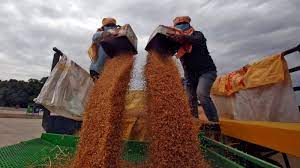
The United Arab Emirates (UAE) suspended re-export of wheat and flour from grain originating in India is basically an assurance that whatever it imports will be used only for domestic consumption.
- The development comes a month after India banned wheat exports to meet the demand of its domestic market, neighbouring countries and vulnerable nations.
- UAE’s Ministry of Economy explained that this decision comes in view of the international developments that have affected trade flows and in appreciation of the solid and strategic relations that bind the UAE and India, especially after the signing of the Comprehensive Economic Partnership Agreement between the two countries and the Indian government’s approval to export wheat to the UAE for domestic consumption.
- India is the world’s second-biggest wheat producer after China. But it accounts for less than 1% of the global wheat trade.
- It keeps a lot of it to provide subsidised food for the poor.
- Its top export markets are Bangladesh, Nepal and Sri Lanka – as well as the United Arab Emirates (UAE).
- India has suspended the export of wheat effective 13 May 2022. In a notification published in the government gazette, the Directorate General of Foreign Trade (DGFT) justified the ban by giving reasons that soaring global wheat prices have put pressure on food security, not only in India, but also in neighbouring and vulnerable nations.
- However, export will be allowed on the basis of permission granted by the Government of India to other countries to meet their food security needs and based on the request of their governments.
- The ban was also prompted decrease in wheat production, after its production was affected by a heatwave that swept across the country during March-April, while the Food Corporation of India (FCI) was unable to mop up ample stocks for buffer stocks.
- The rising inflation also prompted this step.
- The WholeSale Price Index (WPI) in India has moved up from 2.26 per cent at the start of 2022 to 14.55 now. Retail inflation, too, hit an eight-year high of 7.79 per cent in April, driven by rising food and fuel prices.
FATF’s Grey List:
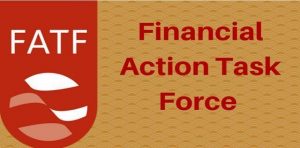
Pakistan got a reprieve from the Financial Action Task Force (FATF) as FATF announced that the country could be removed from the grey list.
- FATF is expected to decide whether to take Pakistan off the ‘grey’ list at the end of its plenary session in Berlin in October.
- Pakistan has been on the FATF grey list continuously since June 2018.
- Grey listing means FATF has placed a country under increased monitoring to check its progress on measures against money laundering and terrorism financing.
- The “grey list” is also known as the “increased monitoring list”.
- As of March 2022, there are 23 countries on the FATF’s increased monitoring list — officially referred to as “jurisdictions with strategic deficiencies” — that include Pakistan, Syria, Turkey, Myanmar, Philippines, South Sudan, Uganda, and Yemen.
Removal from the List:
- To be pulled out of the grey list, a country has to fulfill the tasks recommended by the FATF, for instance, confiscating properties of individuals associated with terrorist groups.
- If the FATF is satisfied with the progress, it removes the country from the list.
- The FATF most recently took Zimbabwe, and before that Botswana and Mauritius, off the grey list.
- Zimbabwe has strengthened the effectiveness of its AML/CFT regime and addressed related technical deficiencies to meet the commitments in its action plan regarding the strategic deficiencies that the FATF identified in October 2019.
- AML/CFT refers to “Anti-Money Laundering/Combating the Financing of Terrorism”.
- In the case of Pakistan, it first entered the list in 2008, left it, and then was on it from 2012 to 2015. Since 2018, it has not been removed from the list.
- The FATF had issued the 27-point action plan after placing Pakistan on the ‘Grey List’ in June 2018.
- The action plan pertains to curbing money laundering and terror financing. A parallel action plan was handed out by the FATF’s regional partner – the Asia Pacific Group (APG) – in 2019.
Next-Generation Corvettes:
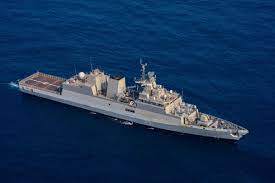
The Defence Acquisition Council (DAC) has given the Acceptance of Necessity (AoN) for procurement of next-generation Corvettes for the Indian Navy at an approximate cost of Rs 36,000 crore.
- A Corvette is the smallest class of naval ships and it falls below the warship class of a frigate.
- These are highly agile ships and are categorised as missile boats, anti-submarine ships, coastal patrol crafts and fast attack naval vessels.
- Modern Corvettes can go up to 2,000 tons in displacement which helps in keeping them agile.
- The Indian Navy at present has the Kamorta Class Corvettes, which are also known as Project 28.
- These ships have an anti-submarine role and are manufactured at Garden Reach Shipbuilders and Engineers in Kolkata.
- These vessels also have the ‘Sanket’ electronic warfare systems and ‘Kavach’ decoy launchers.
- The four Kamorta Class Corvettes that the Indian Navy possesses are named INS Kamorta, INS Kadmatt, INS Kiltan and INS Kavaratti.
- The first of these was commissioned in 2014 and the last one in 2020.
- The next-generation Corvettes will be manufactured for various roles like surveillance missions, escort operations, deterrence, surface action group operations, search and attack and coastal defence.
- These roles will be in addition to the anti-submarine roles being already performed by the existing Corvettes in the Navy.
e-Vidhan System:
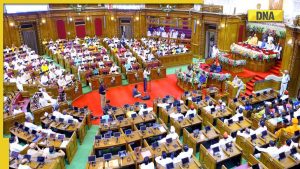
A delegation of MLAs from Gujarat visited the Uttar Pradesh Legislative Assembly in June 2022 to learn about the novel e-Vidhan system for paperless proceedings that has been recently adopted by the UP state assembly.
- The National e-Vidhan Application (NeVA) is a system for digitising the legislative bodies of all Indian states and the Parliament through a single platform on which house proceedings, starred/unstarred questions and answers, committee reports etc. will be available.
- The NeVA system has been developed to make all the work and data related to legislative bodies available online for the use of both citizens and the members of Assemblies. It includes a website and a mobile app.
- This has been done for streamlining information related to various state assemblies, and to eliminate the use of paper in day-to-day functioning.
- Access, particularly for legislators representing rural constituencies, to devices and reliable internet and electricity is an issue. Lack of training and heightened concerns over security are some more recent issues in the road to digitisation.
- Prime Minister Narendra Modi mentioned the idea of “One Nation One Legislative Platform” in November 2021.
- Lok Sabha Speaker Om Birla also said in early 2022 that the proceedings of all legislatures — both Houses of Parliament and state Assemblies and Legislative Councils — will be available on one platform by 2023.
- Nagaland became the first state to implement NeVA, in March 2022.
- In December 2021, the Government of Dubai became the world’s first government to go 100 percent paperless. It announced all procedures were completely digitised.
G33 Ministerial Meeting In Geneva:
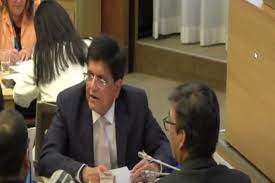
At the G33 Ministerial Meeting in Geneva, Union Commerce and Industry Minister Piyush Goyal expressed his concerns over the stalemate in reaching a permanent solution on the issue of public stockholding and special safeguard mechanism (SSM) for food security.
- The G33 Ministerial Meeting was held on the sidelines of the 12th World Trade Organization (WTO) ministerial meeting in the Swiss town of Geneva.
- The G33 (or the Friends of Special Products in agriculture) is a coalition of developing and least developed countries.
- Despite the name, there are currently 48 member nations including China, Cuba, India, Indonesia, Nigeria, Pakistan etc.
It was established prior to the 2003 Cancun ministerial conference, that have coordinated during the Doha Round of World Trade Organization negotiations, specifically in regard to agriculture. - Dominated by India, The group has “defensive” concerns regarding agriculture in relation to World Trade Organization negotiations, and seeks to limit the degree of market opening required of developing countries.
FIFAe Nations Cup (FeNC) 2022:
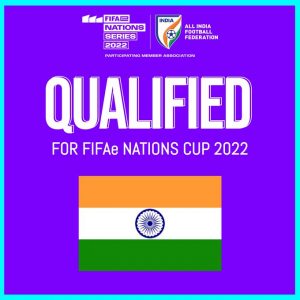
In Football, India created history by securing a spot at the highly coveted FIFAe Nations Cup (FeNC) 2022.
- Representatives from the country will join esports athletes from 23 other nations to compete at the highest level of FIFA 22 Esports from July 26 to 30 in Copenhagen, Denmark.
- The FIFAe Nations Series (FeNS) is an esports tournament held by FIFA and its presenting partner EA Sports. Each tournament has member nations competing in games of the latest incarnation of the FIFA association football video game series.
- The FeNC is one of three major esports events that are held on a worldwide scale to crown the global champions of the game.
Way Finding Application:

The Union Cabinet has approved the proposal for signing of an agreement between the Government of India and the United Nations on a ‘Way Finding Application’ to be used in the Palais des Nations, United Nations Office at Geneva (UNOG).
- The United Nations Office at Geneva (UNOG), consisting of five buildings and 21 floors, is housed at the historic Palais des Nations.
- Large number of delegates, members of civil society and general public visit UNOG to participate in various meetings and conventions.
- Keeping in view the complexity of buildings and huge participation, there was a requirement of a navigational application which can help the visitors and other delegates in finding their way inside the premises while adhering to all security perspectives.
- While the Global Positioning System (GPS) based Apps function in open space, a more precise in-building navigational App will assist the visitors in locating the room and offices.
- The project of development of ‘Way Finding Application’ has been conceptualized as donation from the Government of India to UN on the occasion of its 75th anniversary in 2020.
- The project consists of development deployment and maintenance of a software-based ‘Way Finding Application’ to facilitate navigation in the Palais des Nations premises of UNLG.
- The development of the App has been entrusted to Centre for Development of Telematics (C-DoT), an autonomous telecom Research & Development centre of Department of Telecommunications (DoT), Government of India.
Regulation Of Bigtech And Fintech Companies : RBI
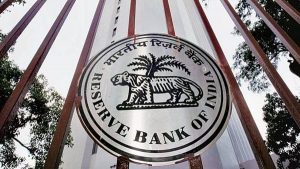
RBI governor has asked for regulation of Bigtech and Fintech companies. For this, With an aim to provide secure and affordable e-payments, the Reserve Bank of India (RBI) has come up with a document ‘Payments Vision 2025’
Document ‘Payments Vision 2025’:
- As part of its Vision 2025, the RBI will attempt
- regulation of big tech and fintech in the payments space
- explore guidelines on payments that involve BNPL(buy now pay later) services
- work towards the introduction of CBDC (central bank digital currency)
- seek inclusion of rupee in continuous linked settlement (CLS) (CLS provides protection for cross-currency settlement in 18 currencies)
UNMESHA:
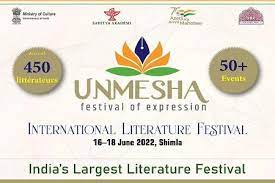
The Ministry of Culture and Sahitya Akademi are organizing Unmesha, an International Literature Festival in Shimla as part of Azadi ka Amrit Mahotsav celebrations, with the support of the Department of Art and Culture, Government of Himachal Pradesh.
- With over 425 writers, poets, translators, critics and distinguished personalities from various walks of life from 15 countries including India, representing over 60 languages and 64 events, UNMESHA is the largest literature festival in the country.
- The Sahitya Akademi was formally inaugurated by the Government of India on 12th March, 1954.
- Though it was set up by the Government, the Akademi functions as an autonomous organisation. It was registered as a society in January 1956, under the Societies Registration Act, 1860.
- Sahitya Akademi, India’s National Academy of Letters, is the central institution for literary dialogue, publication and promotion in the country and the only institution that undertakes literary activities in 24 Indian languages, including English.
- Akademi gives 24 awards annually to literary works in the languages it has recognized and an equal number of awards to literary translations from and into the languages of India, both after a year-long process of scrutiny, discussion and selection.
- It also undertakes literary exchange programmes with various countries across the globe to promote Indian literature.
- The Sahitya Akademi award is the second-highest literary honour by the Government of India, after the Jnanpith award.
Holy Relics Of Lord Buddha:
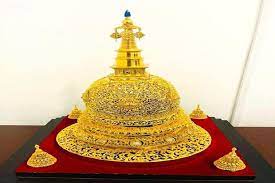
Four Holy Relics of Lord Buddha are being taken from India to Mongolia for an 11-day exposition to coincide with Mongolian Buddha Purnima celebrations.
- These relics are to be displayed at the Batsagaan Temple in Gandan Monastery complex in Ulaanbaatar.
- The four relics come from among 22 Buddha relics, currently housed at Delhi’s National Museum.
- Together, they are known as the ‘Kapilvastu Relics’ since they are from a site in Bihar believed to be the ancient city of Kapilvastu.
- The site was discovered in 1898.
- Relics are sacred objects associated with holy individuals.
- They may be literal body parts (teeth, hair, bones) or objects which the holy person used or touched.
- In many traditions, relics are believed to have special powers to heal, grant favors, or exorcise demons.
World Day To Combat Desertification And Droughts:
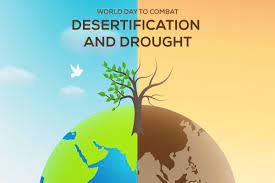
World Day to Combat Desertification and Drought is observed every year on 17th of June.
- On this day, Ministry of Environment, Forest and Climate Change (MoEF&CC) organized Desertification and Drought Day.
- The Union Minister released Forest Stewardship Council’s Forest Stewardship Standard for India (FSC FSSI).
- FSC is a globally recognized certification system which sets criteria for audit of companies associated with timber related products.
- It is a unique moment to remind everyone that land degradation neutrality is achievable through problem-solving, strong community involvement and cooperation at all levels.
- This Year’s Theme: Rising up from drought together.
- It emphasizes the need for early action to avoid disastrous consequences for humanity and the planetary ecosystems.
Barents Sea Warming:
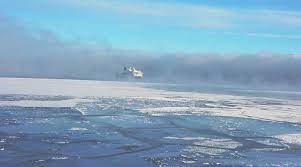
According to a study, it is stated that parts of the Arctic region near Norway are warming at as much as seven times the rate of warming in the rest of the world.
- The region around the northern Barents Sea has been warming two to two-and-a-half times the average warming of the Arctic region and five to seven times the warming in the rest of the world.
- Such intense warming has never been observed in the Arctic region before.
- This is leading to the phenomenon of Atlantification.
- The Barents Sea borders the Norwegian and Greenland Sea in the west, the Arctic Sea in the north and the Kara Sea in the east.
- The Barents Sea is divided between Russia and Norway as defined by the United Nations Convention on the Law of the Sea (UNCLOS).
- Scientists have discovered ‘hotspots’ where some parts of the Barents Sea have started to closely resemble the Atlantic.
- This phenomenon has been termed Atlantification.
- The north-flowing ocean currents transport the warm waters of the Atlantic into the Arctic Ocean through the Barents Sea.
- Unlike the Atlantic and Pacific, the upper waters of the Eurasian Arctic Ocean get warmer as they get deeper.
- The top of the ocean is typically covered by sea ice. Below this is a layer of cool freshwater, followed by a deeper layer of warmer, saltier water delivered to the Arctic from the Atlantic by ocean currents.
- According to NASA data, the total area covered by sea ice in this region has fallen by almost half since satellite records began in the early 1980s.
- One possible reason for this is that, when sea ice melts through the summer, it replenishes the freshwater layer that sits above the warmer Atlantic layer. With less sea ice around, the amount of freshwater dwindles, this, in turn, causes the ocean to mix together, drawing more Atlantic heat up towards the surface.
- This “Atlantification” can, in turn, cause more ice to melt from below.
- Human-caused global climate change has been accelerating the Atlantification process and this will in turn significantly affect the weather patterns, ocean circulations, and the entire Arctic ecosystem.




